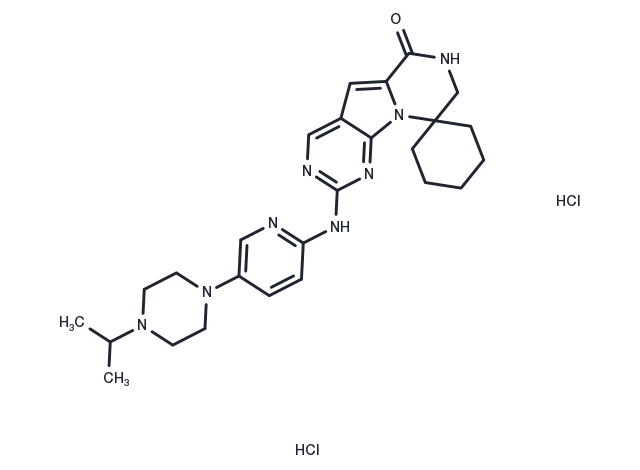Powder: -20°C for 3 years | In solvent: -80°C for 1 year


Lerociclib dihydrochloride (G1T38 dihydrochloride) is a potent and selective inhibitor of CDK4/CDK6, with IC50s of 2 nM and 1 nM for CDK6/CyclinD3 and CDK4/CyclinD1, respectively.

| Pack Size | Availability | Price/USD | Quantity |
|---|---|---|---|
| 1 mg | In stock | $ 31.00 | |
| 2 mg | In stock | $ 44.00 | |
| 5 mg | In stock | $ 72.00 | |
| 10 mg | In stock | $ 122.00 | |
| 25 mg | In stock | Inquiry | |
| 50 mg | In stock | Inquiry |


| Description | Lerociclib dihydrochloride (G1T38 dihydrochloride) is a potent and selective inhibitor of CDK4/CDK6, with IC50s of 2 nM and 1 nM for CDK6/CyclinD3 and CDK4/CyclinD1, respectively. |
| Targets&IC50 | CDK6-CyclinD3:2 nM, CDK5-p35:832 nM, CDK2-CyclinA:1.5 μM, CDK5-p25:1.2 μM, CDK1-CyclinB1:, CDK2-CyclinE:3.6 μM, CDK4-CyclinD1:1 nM, CDK9-CyclinT:28 nM |
| In vitro | Lerociclib produces a robust and sustained G1 arrest in CDK4/6 dependent cells with an EC50 of ~20 nM. A dose dependent increase of cells in the G1 phase of the cell cycle is observed when CDK4/6 dependent WM2664 cells are treated with G1T38 for 24 hours. This arrest is maintained through 300 nM, more than 300x the biochemical IC50. WM2664 cells treated with 30-1000 nM of Lerociclib for 24 hours exhibits a complete inhibition of RB phosphorylation compared to vehicle controls. Treatment with G1T38 reduces RB phosphorylation within 1 hour post-treatment and generates near complete inhibition of RB phosphorylation by 16 hours post-treatment. G1T38 produces a robust inhibition of proliferation in a diverse array of tumor cell lines including breast, melanoma, leukemia and lymphoma with EC50 concentrations as low as 23 nM.Within the CDK family, Lerocyclib is least selective against CDK9/cyclin T, ~30 fold between CDK4/cyclin D1 and CDK9/ cyclin T at the biochemical IC50. |
| In vivo | In this HER2+ breast cancer model, Mice treated with Lerociclib elicits 8% tumor regression after 21 days of treatment while control animals have a 577% increase in tumor burden over the same treatment period.Compared to the vehicle-treated mice, daily treatment with 100 mg/kg of Lerociclib or palbociclib shows tumor regression within 10 days in the MCF7 xenograft model.After 27 days of treatment, tumor growth inhibition is observed in the 10, 50, and 100 mg/kg Lerociclib cohorts (approximately 12%, 74%, and 90% inhibition, respectively).Daily oral palbociclib treatment causes an 18%, 66%, and 87% tumor growth inhibition in the 10, 50, and 100 mg/kg dosage cohorts, respectively. |
| Synonyms | G1T38 dihydrochloride |
| Molecular Weight | 547.52 |
| Formula | C26H36Cl2N8O |
| CAS No. | 2097938-59-3 |
Powder: -20°C for 3 years | In solvent: -80°C for 1 year
H2O: 4 mg/mL (7.31 mM), Sonication is recommended.
You can also refer to dose conversion for different animals. More
bottom
Please see Inhibitor Handling Instructions for more frequently ask questions. Topics include: how to prepare stock solutions, how to store products, and cautions on cell-based assays & animal experiments, etc.
Lerociclib dihydrochloride 2097938-59-3 Cell Cycle/Checkpoint CDK Inhibitor G1T38 Dihydrochloride G1T38 dihydrochloride Lerociclib Dihydrochloride inhibit G1T38 Lerociclib Cyclin dependent kinase inhibitor
